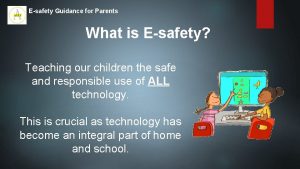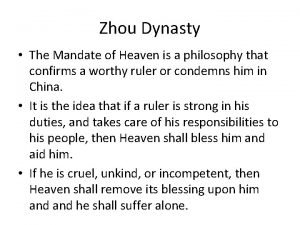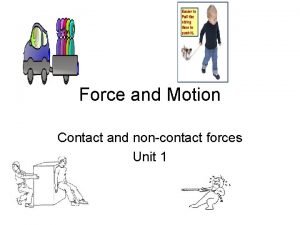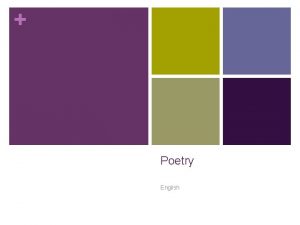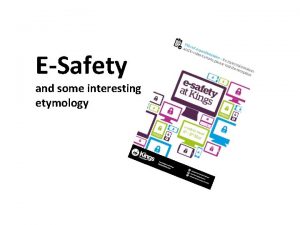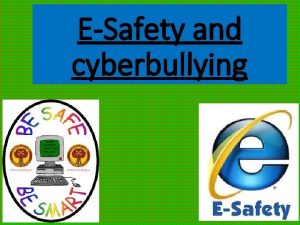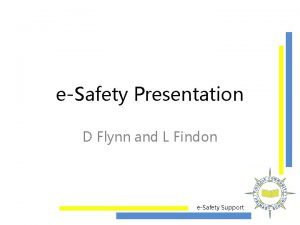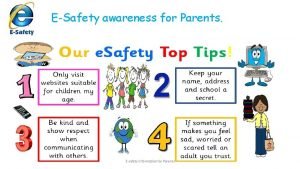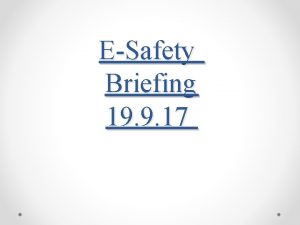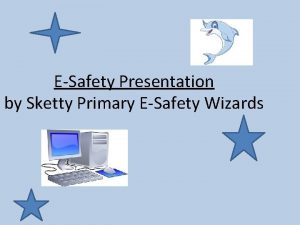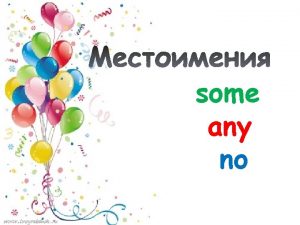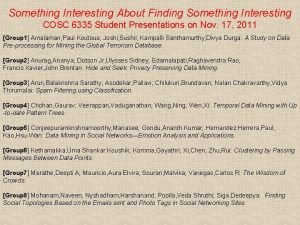ESafety and some interesting etymology The internet is





























- Slides: 29

E-Safety and some interesting etymology

The internet is like an empty room. It is defined by the people who inhabit it.


Wi-Fi These days, most people connect to the internet using a Wi-Fi connection. But what does the term Wi-Fi actually mean?

Hi-Fi / Wi-Fi • Hi-Fi stands for ‘High Fidelity’ • Fidelity means accuracy, exactness, exactitude, precision, preciseness, correctness. • Something that plays a recording with ‘high fidelity’ produces a sound that is very similar to the original. • ‘Infidelity’ is usually used to describe an action which is not faithful or true • ‘Infidel’ is used to describe a person who is not faithful to a dominant religion (they believe something different).

Wi-Fi • It doesn’t stand for ‘Wireless Fidelity’ • It was coined (created) as a brand name because it sounded like Hi-Fi • The original name was "IEEE 802. 11 b Direct Sequence“ • Wi-Fi is a brandname, like Google, Hoover, Aspirin and Heroine.

What would Facebook actions be like in the physical world?

Define, be aware, do • Chatting • Sharing • Browsing Content • Networking (closely relates to ‘sharing’) • Shopping and commerce

Chatting ‘chat’ is short for ‘chattering’, which is the sound your teeth make when you’re cold. ‘The chattering classes’ are the middle classes. What is chatting? There are lots of different ways to chat on line. Chatting includes every type of service which allows you to have a conversation (two-way). It can be text based messaging, such as instant messaging (IM) or text messaging (SMS) or via a voice or video link (such as by Vo. IP internet phone calls or a webcam). It can be instant, real-time communication (chat rooms or instant messaging) or delayed (such as e-mail, text message or voicemail).

Things to think about • Know who you’re talking to online; if you don’t know someone face to face they could be anyone. (avatar) • Remember – what you do or show on your webcam can be recorded and what they do or show on their webcam at the other end might be a recording. • Avoid having one-sided webcam conversations where the other person’s webcam is ‘broken’ or, ‘not working…’; you won’t know who they really are, what they are doing or who they are watching with

Who are you really talking to?

Things to do Keep your personal information private Create friend lists. Keep your clothes on when using a webcam Use private messages for people you know in person and trust Use a strong and unique password Know how to block someone if they make you feel uncomfortable or upset • Learn how to save chat logs and texts so that if someone does make you uncomfortable/upset, you have the evidence to report them • Remember to log out of a service properly after use, especially on a shared computer • • •

Sharing What is sharing? • If you have something you’re proud of then it can feel good to share it with others. • Maybe its a photo you’ve taken or a video you’ve made. • Maybe you have opinions and thoughts you want to share on a • or you want to share your interests with people who like the same things as you • One of the great things about sharing on the internet is that it’s so quick and easy - you just click a button on your computer, smartphone or digital camera and it’s there online. • Remember your ‘digital footprint’

Bluetooth was named after a tenth-century king, Harald Bluetooth, King of Denmark and Norway He was known for his unification of previously warring tribes.

Things to think about • Once you’ve shared something online you’ve lost control and ownership of it • Remember that people may still be able to see things you share online years into the future • If you’re unsure about what to share, ask yourself this: ‘Would I show this to my parents/teacher? ’ If the answer is ‘no’, don’t share it online • Some people could use information or things you’ve shared in ways you don’t like or couldn’t have imagined • Some people could share things about you which are upsetting - without your knowledge

Things to do • Find out how to use the privacy settings on the service you use. These settings will help you take control of your information so that you can decide what information you will share, and who you will share it with. • Keep your personal information private – this includes photos of you and your friends, email, phone number, date of birth, address and location; only share them with people you know and trust. • Only upload pictures of yourself which you would be happy for your parents to see. • Only share details of your location with people you know in person and trust.

Gaming What is gaming? • Playing games online against other people can be really enjoyable and great fun. You can do it via a mobile phone, a computer or a games console and online games come in every shape and form. There are the ones where you each take a turn - like chess on a mobile phone app - and others where you compete to get your scores as high as you can on a leaderboard. Then there are the 3 D virtual worlds where hundreds or thousands of people are simultaneously playing against each other. Online gaming has something for everyone and millions of children and young people across the UK regularly take part. Below are some tips to ensure you get the most out of your online gaming experience.

Things to think about • When you’re gaming as part of a network this often involves live online chat and you’re playing with real people. • You should be respectful to others in the game and understand the rules and boundaries of the website or community.

E-gaming: Things to do • Keep gaming friends ‘in the game’ – avoid sharing personal information with people you’ve met in games and avoid giving them your social networking profile details or email address. Also, choose a user name that does not reveal any personal information about you. • Use a strong and unique password for all of your online accounts – a combination of letters, numbers and symbols (and if you’ve ever shared your password in the past, change it) • Learn how to block people you don’t want to be in contact with any more. If you experience any bullying, hacking or racism, save the evidence and report it • Remember to always log out of a service properly after use, especially on a shared computer • Experts recommend you take regular 5 minute breaks every 45 minutes to an hour to help your concentration

Browsing Content As a noun, the stress is on the 1 st syllable of ‘content’. What is browsing / surfing? The key difference between the two terms is that ‘web browsing’ means going through or searching for a specific information on a specific website, whereas the term ‘web surfing’ means going through information aimlessly on different subjects on the different websites.

Things to think about • Not everything you read or see online is true • There are things online you might find upsetting and distressing • Downloading may harm your computer or mobile device and could be illegal - this is especially true of illegal filesharing sites • If you make music, film or TV available to others on a filesharing network, download from an illegal site or sell copies without the permission of those who own the copyright then you are breaking the law • Copying someone else’s ideas or work and passing them off as your own is called plagiarism – most educational institutions now use plagiarism-software to detect copied (or partially copied content) – ESPECIALLY IN THE UNITED KINGDOM.


Things to do • Learn how to block pop ups • Check whether information is true by looking on at least two other sites • Use reputable sources of information you know and trust (Wikipedia? ) • Only open attachments or click on links in emails you are expecting; if you get a suspicious-looking email, even from a friend, it might not be genuine if their computer has been infected by a virus and you should not open it (phishing) • If an offer seems too good to be true, it probably is!



Shopping and commerce

Things to think about • Remember – if an offer seems too good to be true, it probably is • It’s also a good idea to look for unbiased reviews of online retailers. Cross-check information on the internet and see if anyone else has had problems • Beware of online scams, which can be very convincing; check that online stores have a physical address and telephone contact details

Things to do • When paying for goods and services online, make sure the website address in the browser window begins with https: // – the ‘s’ stands for ‘secure’ • Look for the padlock symbol on payment pages. Don’t be fooled by a padlock that appears on the web page itself. • Always use a strong password for online accounts – a combination of letters, numbers and symbols • Remember to always log out of a service properly after use, especially on a shared computer

Get safe, stay safe & pass the message on!
 Interesting more interesting the most interesting
Interesting more interesting the most interesting Teaching esafety
Teaching esafety Safe etymology
Safe etymology Neeki meshkat
Neeki meshkat What are some interesting facts about dolphins
What are some interesting facts about dolphins What are some interesting facts
What are some interesting facts Cassandra make a venn diagram
Cassandra make a venn diagram What was the mandate of heaven
What was the mandate of heaven 5 interesting facts about ladybugs
5 interesting facts about ladybugs Contact and noncontact forces
Contact and noncontact forces Some trust in horses
Some trust in horses They say it only takes a little faith to move a mountain
They say it only takes a little faith to move a mountain They say it only takes a little faith to move a mountain
They say it only takes a little faith to move a mountain Ice cream is a countable or uncountable noun
Ice cream is a countable or uncountable noun Fire and ice diamante poem
Fire and ice diamante poem Some say the world will end in fire some say in ice
Some say the world will end in fire some say in ice What is internet
What is internet Etymology and morphology
Etymology and morphology Hát kết hợp bộ gõ cơ thể
Hát kết hợp bộ gõ cơ thể Ng-html
Ng-html Bổ thể
Bổ thể Tỉ lệ cơ thể trẻ em
Tỉ lệ cơ thể trẻ em Voi kéo gỗ như thế nào
Voi kéo gỗ như thế nào Tư thế worm breton là gì
Tư thế worm breton là gì Chúa yêu trần thế
Chúa yêu trần thế Môn thể thao bắt đầu bằng từ đua
Môn thể thao bắt đầu bằng từ đua Thế nào là hệ số cao nhất
Thế nào là hệ số cao nhất Các châu lục và đại dương trên thế giới
Các châu lục và đại dương trên thế giới Công của trọng lực
Công của trọng lực Trời xanh đây là của chúng ta thể thơ
Trời xanh đây là của chúng ta thể thơ

